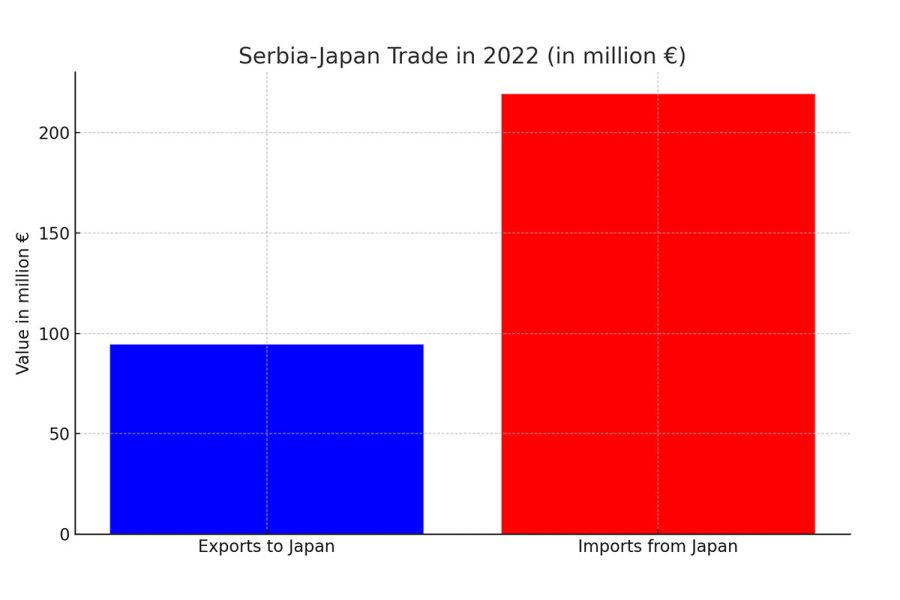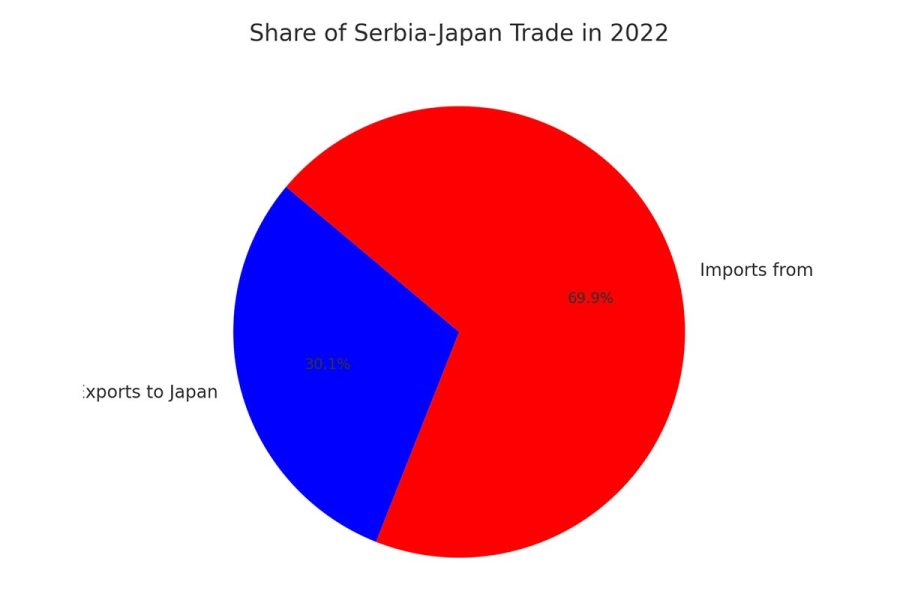The distance of more than 9,000 kilometres separating Belgrade and Tokyo certainly represents one of the key reasons why the trade exchange between the two economies remains modest, although it is growing. However, it has become apparent that the distance between the two markets is no longer a barrier when it comes to Japanese companies recognising Serbia as their new European hub of business, manufacturing and technology. After Germany, which hosts the largest number of Japanese companies in Europe, followed by Poland and Czechia, where Japanese investors were keen to invest in the early 2000s, Serbia welcomed its first Japanese investment in 2006
After about twenty companies present on the local market since the time of the former Yugoslavia, such as Mitsubishi, the first Japanese investment arrived in Serbia in 2006. Japan Tobacco International (JTI) acquired the Tobacco Industry in Senta and, according to company data, has since invested over 300 million euros in tobacco production and processing (including initial and ongoing investments). The company also has plans to invest around 50 million dollars over the next five years. Following investments in the tobacco industry, the Panasonic Group invested in producing energy-efficient electronic components for lighting in Svilajnac and YAZAKI invested in the manufacturing of cable sets in Šabac.

Kansai invested in the Serbian chemicals industry with the acquisition of Gornji Milanovac-based Slovenian company Zvezda Helios, while HI-LEX acquired an Italian firm based in Sremska Mitrovica that produces electrical and electronic equipment for motor vehicles. Mayekawa invested in a local company in Smederevo with which it had already established cooperation on the production of refrigeration compressors and heat pumps. Aquafarm SEE launched investments in agriculture in Srbobran. Itochu Corporation entered into the ownership structure of local company Master Fruits through its subsidiary (Master Frigo has a joint venture with the Japanese investment fund Itochu, which owns American company Dole Packaging).
Japanese company Takeda – alongside Germany’s Merck Sharp and Dohme, Swiss Roche and Swiss Rockets, American company Pfizer and China’s BGI Group – will be one of the global partners in Serbia’s BIO4 Campus centre
A turning point in bilateral economic relations between the two countries came in 2018, with the first visit of a Japanese official to Serbia in three decades when then-Japanese Prime Minister Shinzo Abe visited, accompanied by a delegation of 16 representatives of major Japanese companies that are recognised globally. The beginning of the following year saw the entry into force of the EU-Japan Free Trade Agreement, representing a significant juncture in cooperation with Serbia, as a country situated on the EU border and committed to European integration. This new chapter in economic cooperation was quickly crowned by two Japanese multinational companies: Toyo Tires and Nidec, which decided to invest in Serbia and thus more than double the Japanese investment impact in the country.
According to official data from Serbia’s central bank, the National Bank of Serbia (NBS), Japan invested €465 million in Serbia between 2013 and the third quarter of 2023. Over the previous four to five years, more than 90 per cent of these investments have come directly from Japan, while in the last two years a total of twothirds of investments (over 300 million euros) have come from Japan.

Toyo Tires opened its premium-class automotive tire factory in Inđija in mid-December 2022, in an effort to cater to the needs of renowned global car manufacturers and markets in Europe, the Middle East, Africa and North America. This marked the corporation’s first greenfield investment in Europe.
As part of a grand plan to invest up to 1.5 billion euros in Europe (with the largest portion earmarked for Serbia), one of the world’s largest electric motor manufacturers, Nidec Corporation, embarked on its conquest of the European market from its new base in Novi Sad. It opened two factories in spring 2023: Nidec Electric Motors, which produces electric motors for power steering and drive motors for hybrid vehicles; and Nidec Elesys Europe, which manufactures inverters and electronic automobile control units. In addition to the capital invested, job creation and boost to exports from Serbia, these investments also bring modern technologies, high standards and transfers of knowledge to the Serbian economy. A particular highlight of Nidec’s research and development centre, where existing products will be enhanced and new ones created, is its strategic partnership with a local institution in the University of Novi Sad. There is mutual confidence that these two investments will lead to a wave of new Japanese investors interested in better positioning themselves on the European market and seeing Serbia as a new investment destination. According to some reports, the arrival of six Nidec suppliers is expected in the coming period, with five of them coming from Japan.
Many are particularly interested in collaboration and investment in innovative infrastructure, energy, environmental protection, biotechnology and the ICT sector
The positive experiences of investors in the tobacco, electrical, chemicals and food industries, as well as projects undertaken by Japanese companies Itochu Corporation and Mitsubishi Hitachi Power Systems in Serbia (Vinča landfill and the TENT desulphurisation project), have sparked interest among other Japanese firms. Many are particularly interested in collaboration and investment in innovative infrastructure, energy, environmental protection, biotechnology and the ICT sector.

Japanese company Takeda – alongside Germany’s Merck Sharp and Dohme, Swiss Roche and Swiss Rockets, American company Pfizer and China’s BGI Group – will be one of the global partners in Serbia’s BIO4 Campus centre. This centre, the construction of which began in Belgrade recently, is set to rank among the most significant bioeconomic centres in Europe.
Judging by last year’s visit to Japan of Serbian Energy and Mining Minister Dubravka Đedović Handanović, as well as the predominant topics discussed by the highest Serbian state officials with the Japanese Embassy in Belgrade and with Japanese governmental and business associations, the strongest impact on economic relations between the two countries over the period ahead will come from cooperation in the field of energy. Serbian projects related to green energy transition and the construction of energy infrastructure, worth 15 billion euros and including the reversible hydropower plant project in Bistrica, present opportunities for Japanese investors and the transfer of Japanese technologies – from technology for harnessing hydropower to hydrogen technology, in which Japan is considered a global leader.
THE IMPORTANCE OF COOPERATION
Collaboration with Japan, which ranks as the world’s third-largest economy and is renowned for its high total product value, technological advancement and industrial potential, along with Japanese companies that epitomise the most successful business models, top-quality and technological innovation, impeccable organisation, efficient production and business discipline, holds immense significance for the Serbian economy and Serbian companies. Every new business arrangement with Japanese companies and every export deal to the Japanese market will serve to prove that Serbia has attained reliability and trustworthiness for the demanding Japanese market and its discerning partners in Japanese corporations. Each Japanese investment in Serbia is evidence of achieved in enhancing the business and investment climate and confirms that Serbia is becoming an attractive destination for investments from Japanese companies.
Serbia is also interested in attracting investments and building its capacity to exploit and process rare or critical mineral resources that the region possesses (such as lithium, copper, nickel, borates, natural graphite, antimony and magnesite). These resources are essential to a successful green transition and the production of new hightech and energy-efficient products, such as electric vehicle batteries or energy storage batteries, as well as solar panels.

Over time, strengthening economic ties through investment cooperation and technology transfers could stimulate and increase the trade volume and Serbian exports to the distant, highly demanding, selective and protected Japanese market. Mutual trade has increased 2.5-fold over the last ten years, while Serbian exports to Japan have grown 15-fold. Although around 2,500 Serbian companies trade with Japan (mostly as importers), the actual impact remains well below the potential. In 2022, the most recent year for which statistics exist for all 12 months, the total goods trade between the two countries amounted to only €313.8 million, with Serbia exporting goods worth €94.5 million to Japan and imports with a total value of €219.3 million.
In 2022, the total goods trade between the two countries amounted to only €313.8 million, with Serbia exporting goods worth €94.5 million to Japan and imports with a total value of €219.3 million
Previous contacts between entrepreneurs and business association analyses indicate opportunities for increased sales of Serbian agricultural and food products, especially Serbian berries that are highly valued in Japan (frozen raspberries, fruit derivatives) and organic products, wines, mineral water, spirits and medicinal teas.
Opportunities for better acquisitions and connecting the countries’ business communities will be provided by the participation of Serbian companies in EXPO 2025 in Osaka and Japanese companies in the specialised Expo 2027 world exhibition to be held in Belgrade. Establishing the Serbian- Japanese Business Club in Tokyo, which will work to deepen economic cooperation between the two countries, alongside the Japanese Business Alliance in Belgrade, chambers of commerce and other business associations, will also serve to stimulate and support new business arrangements.
